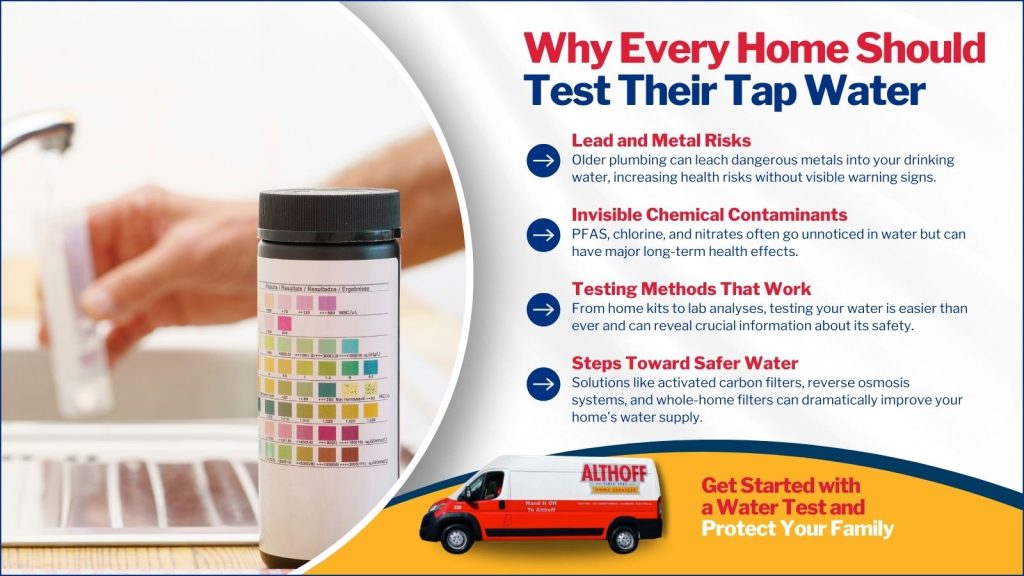You pour a glass of water from the tap expecting something clean, refreshing, and safe—but have you ever stopped to think about what else might be flowing through your pipes? While most municipal water supplies meet legal safety standards, they can still carry a range of unwanted contaminants.
If you’ve never taken the time to test your tap water, you might be surprised by what you find. Schedule an appointment with our team for water testing and learn more about whole-house solutions for cleaning your water and improving overall water quality.

What Might Be in Your Tap Water?
Tap water can contain dozens of contaminants, even in cities with well-maintained infrastructure. Many of these are invisible and odorless, making them difficult to detect without proper testing. Here are some of the most common culprits found in residential water supplies:
1. Lead
Lead is one of the most dangerous substances that can infiltrate your water supply, and it often comes from older pipes or plumbing fixtures. Exposure to lead—even in small amounts—can cause developmental problems in children and long-term health issues in adults.
2. Chlorine and Chloramines
Municipal systems often use chlorine or chloramine to disinfect water. While these chemicals are effective at killing bacteria, they can cause unpleasant tastes, odors, and potential health effects when present in high concentrations.
3. PFAS (Forever Chemicals)
Per- and polyfluoroalkyl substances, or PFAS, are man-made chemicals used in everything from nonstick cookware to firefighting foam. These “forever chemicals” don’t break down easily and have been linked to cancer, hormonal disruption, and immune system effects.
4. Nitrates
Common in agricultural areas, nitrates can enter water supplies through runoff from fertilizers, animal waste, or septic systems. They pose a serious risk to infants and young children by interfering with the blood’s ability to carry oxygen.
5. Microorganisms
Bacteria, viruses, and protozoa can all find their way into tap water—particularly after flooding or when infrastructure becomes compromised. Even small amounts of E. coli or Giardia can cause significant illness.
How to Test Your Tap Water
If you want peace of mind about your drinking water, testing is the first and most important step. Here’s how to get started:
- Review your annual water quality report – Public water systems are required by law to provide a Consumer Confidence Report (CCR) each year. This document outlines the sources of your water and what contaminants were detected. However, it doesn’t reflect what’s happening inside your home’s pipes.
- Use online databases – Websites like the EWG Tap Water Database let you search by ZIP code to see local water quality data. For residents in ZIP 60014, the Waterdrop testing page also provides a helpful breakdown of what may be found in your area’s water.
- Test at home – Home testing kits can detect pH levels, hardness, chlorine, bacteria, and heavy metals like lead. For more detailed results, you can send a water sample to a certified lab for a complete analysis.
Why Water Quality Matters for Your Health
Contaminated water can have both immediate and long-term health consequences. Even if your water tastes fine, it may still carry risks to your family’s well-being. Long-term exposure to pollutants can contribute to:
- Developmental issues in children
- Reproductive problems
- Increased cancer risk
- Kidney and liver damage
- Skin irritation or rashes
If you or a loved one has a compromised immune system, the risks are even higher.
How to Improve the Quality of Your Tap Water
Once you’ve tested your water, the next step is choosing the right filtration solution. Depending on what you find, your options might include:
- Activated Carbon Filters: Great for removing chlorine, taste, and odor.
- Reverse Osmosis Systems: Effective against a wide range of contaminants, including heavy metals and PFAS.
- Whole-Home Filtration Systems: Ideal for households that want cleaner water at every tap.
- Water Softeners: Useful for reducing mineral buildup from hard water.
Regular filter replacement and plumbing maintenance are also essential for maintaining clean water flow throughout your home.
Contact Althoff Home Services today to schedule an appointment with our professionals. Chicago’s Choice Since 1961. Hand It Off to Althoff!

